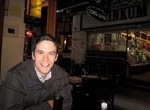 A few weeks ago, I returned to the Faculty of Medicine at the University of Lisbon—the medical school from where I graduated ten years ago. The reason was to participate at the AIMS meeting, an international conference for medical students as both a member of the jury of the oral presentations and as a speaker.
A few weeks ago, I returned to the Faculty of Medicine at the University of Lisbon—the medical school from where I graduated ten years ago. The reason was to participate at the AIMS meeting, an international conference for medical students as both a member of the jury of the oral presentations and as a speaker.
I was blown away by the staggering changes that have occurred in both my alma mater and in undergraduate medical education in a decade.
Firstly, when I was a medical student, there was no such thing as international conferences for medical students, but apparently there is a vibrant international circuit now, with The Netherlands due to host a major medical student’s conference in June.
Secondly, the medical school now has a state of the art building, and I was impressed to see how many more students are involved in research, particularly basic science research. As a member of the jury, I had to appraise oral presentations of both clinical and basic science research projects, and I have to admit I struggled to understand many of the intricacies of the basic science presentations. Molecular cell biology and genetics now seem to have a bigger weight in the students’ curriculum compared to my days. I think that this is partly due to the advances in those fields as well as to the development of the medical schools’ flagship research institute, the Institute of Molecular Medicine.
I also asked some of the students what are the methods they use to learn and study these days. Even though there is less emphasis than I thought on online learning, paper textbooks, like I used, are a thing of the past, with some students preferring to read the digital versions on tablets. Moreover, structured compilations of lecture notes are widely shared.
The conference also included a scientific speed dating session, which was something I had never experienced before. The organizers basically spread some of the lecturers from the meeting (including myself) in a large room, and medical students had five minutes each to ask questions and speak to each of the lecturers before having to move on to the next one. It was psychologically intense and exhausting yet rewarding, as I felt the idea was to be inspiring and share our experience and know-how. Most of the questions I was asked were about research, publications, and career advice.
There were dozens of courses and workshops on the most fascinating clinical and non-clinical topics, and I could only be sorry that I only had time to sit through only one workshop about neurological emergencies, but I wish I could have attended almost all of them, since most of them seemed relevant for my continuous medical education.
In my keynote lecture, and having been instructed by the organizing committee to “broaden horizons”, I encouraged students in the audience to make the most of the opportunities that present to them, and gave them my unusual personal example of being a medical student who developed a strong interest in medical journalism and editing to the point of becoming the first non-British editor of Student BMJ, and who then went on to become a professional editor.
I was pleased to talk again to some former professors of mine (who are still teaching), who were also part of the jury panel of the oral presentations. It felt slightly odd, though, to be in a position of parity now, even though it was highly fulfilling to be able to engage in scientific discussions. My former professor of genetics, for example, was enthusiastically telling me about mendelian randomization studies, which are increasingly seen by The BMJ’s research editors. There’s even a Research Methods and Reporting paper about mendelian randomization.
I was impressed at how a group of medical students managed to set up an extremely well organized and ambitious event, and left the meeting with the comforting feeling that the future of medicine seems to be in great hands.
Tiago Villanueva is assistant editor, The BMJ.
Competing interest: Tiago is a former student at the University of Lisbon. His travel expenses were covered by the organizers of the meeting.
